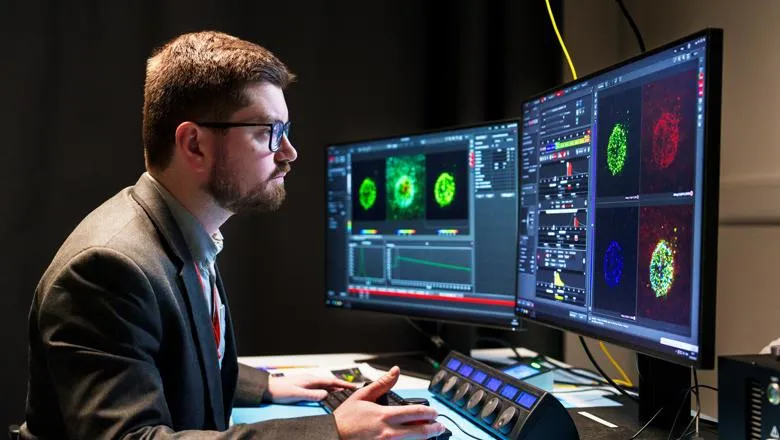This strategic award represents a significant landmark for the UK bioimaging community. The expansion of the UK Node and ringfenced funds for access will open new doors for many researchers, accelerating impactful discoveries across life science domains and strengthening the UK's position as a global leader in bioimaging research.
Professor Maddy Parsons, Professor of Cell Biology at King’s, UK Node Lead Investigator and Director of BioImagingUK
02 June 2025
£1.8M investment to expand access to bioimaging research infrastructure
The UK Euro-BioImaging Node – a multi-sited national infrastructure offering open-access to advanced biological imaging techniques – has received a £1.8 million strategic award from UKRI-BBSRC and UKRI-MRC to expand access to cutting-edge imaging technologies for UK researchers.

The five-year investment will revolutionise how UK life scientists access advanced biological and biomedical imaging facilities, democratising technology that underpins research studies spanning from single-molecule to whole-organism.
King’s is one of seven sites that make up the current UK Euro-BioImaging Node, along with OCTOPUS at Harwell, Liverpool University, York University, Edinburgh Super-Resolution Imaging Consortium (ESRIC), Oxford Brookes University, and the Francis Crick Institute. Each site offers access to state-of-the-art imaging equipment, expertise, training and image data services for a wide range of fundamental and translational research projects at molecular to cellular resolutions, in single cells to 3D, in vitro models and whole organisms.
The funding will expand access to state-of-the-art bioimaging technologies across the UK in a number of ways:
1. Breaking down access barriers
Many researchers experience challenges in accessing state-of-the-art bioimaging technologies because of the high costs and advanced technical skills required to operate and interpret the data. Up to £800,000 of the investment will be allocated for user access funds, enabling UK researchers to apply to use both UK-based facilities and the additional 200+ facilities within the Euro-BioImaging portfolio.
2. Expanding the UK Euro-BioImaging Node
The funding will enable an increase in the number of biological imaging sites and technologies available, creating improved geographical coverage and technological diversity.
It will also enable the incorporation of biomedical imaging – for the first time, the UK Node will include both pre-clinical and clinical imaging technologies such as MRI, PET/CT, and other medical imaging modalities.
3. Supporting technical talent
The Research Technology Professionals and Imaging Scientists who operate advanced bioimaging instruments face significant challenges in accessing funds to advance their knowledge, skills and networks. The programme allocates funding specifically for UK Node facility staff to attend training, job shadowing, and networking events, increasing skills development and visibility for these professionals.
4. Driving Open Science through data sharing
Open access and FAIR (Findable, Accessible, Interoperable, Reusable) data principles are critical to enable open sharing of all data for onward re-use by the global community. Currently only a small fraction of bioimaging data is shared with the broader community, limiting reproducibility and potential impacts through reuse.
The new investment will support a dedicated Data Steward based at the European Bioinformatics Institute (EMBL-EBI) who will provide training and one-to-one guidance for UK Node users to deposit bioimaging data in appropriate repositories. The Data Steward will further train and upskill UK Node facility staff to support their users in FAIR data.
5. Increasing academic-industry interactions
The expanded UK Node will strengthen connections with industry, particularly benefiting in the life sciences and biopharma sectors. Dedicated industry partnering events will showcase the UK Node capabilities, facilitate networking between academic facilities and commercial users with benefits to both sectors whilst boosting UK economic growth and innovation. This engagement will be supported through strong links to the Euro-BioImaging Industry Board, and partnerships including the Royal Microscopical Society, the BioIndustry Association, and ELRIG.
For researchers interested in learning more about accessing UK Node facilities or the upcoming calls for new sites, please visit the BioImagingUK website.

